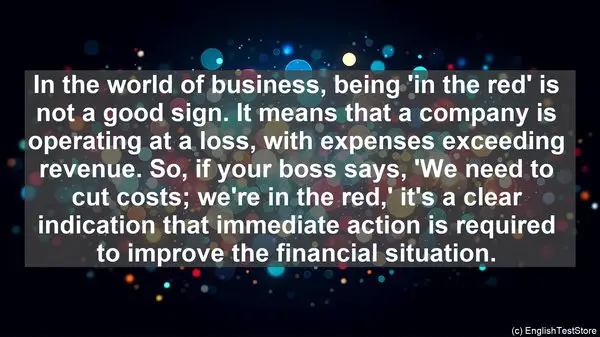Introduction: The Power of Idioms in Business Communication
Welcome to today’s lesson . Idioms are not just colorful expressions; they play a crucial role in effective communication, especially in the business world. When used correctly, idioms can convey complex ideas concisely, making your conversations more engaging and impactful.
1. ‘Cutting Corners’: Efficiency vs. Quality
Imagine you’re working in a warehouse, and you hear someone say, ‘Don’t cut corners on this order.’ What does it mean? Well, it’s a way of saying that while speed is important, it should never compromise the quality of your work. It’s a reminder to always strive for excellence, even when time is of the essence.
2. ‘In the Red’: Financial Troubles
In the world of business, being ‘in the red’ is not a good sign. It means that a company is operating at a loss, with expenses exceeding revenue. So, if your boss says, ‘We need to cut costs; we’re in the red,’ it’s a clear indication that immediate action is required to improve the financial situation.

3. ‘Ballpark Figure’: Rough Estimate
When discussing numbers or budgets, you might come across the phrase ‘ballpark figure.’ It refers to a rough estimate, not an exact amount. For example, if a client asks for a quote, and you’re not sure of the precise cost, you can give them a ballpark figure to provide an initial idea.
4. ‘On the Same Page’: Alignment and Understanding
In any team, it’s crucial to ensure everyone is ‘on the same page.’ This means that everyone shares the same understanding, goals, and vision. It’s a way of fostering collaboration and avoiding misunderstandings. So, before starting a project, it’s essential to have a meeting to get everyone ‘on the same page.’
5. ‘Bells and Whistles’: Extra Features
When discussing a product, ‘bells and whistles’ refer to its additional features or enhancements. While these extras might be appealing, it’s important to remember that the core functionality and value should always be the priority. So, when making a purchase decision, don’t get swayed by just the ‘bells and whistles.’
6. ‘Cash Cow’: Profitable Venture
A ‘cash cow’ is a business or product that consistently generates substantial profits. It’s like a reliable source of income. For example, if a company has a flagship product that sells well year after year, it can be considered their ‘cash cow.’ It’s a term often used in discussions about investment opportunities.
7. ‘In the Pipeline’: Upcoming or Planned
When something is ‘in the pipeline,’ it means it’s in the process of being developed, produced, or planned. For instance, if your manager says, ‘We have some exciting projects in the pipeline,’ it indicates that there are upcoming opportunities or initiatives that you can look forward to.
8. ‘Make or Break’: Critical Moment
A ‘make or break’ situation is a critical moment where the outcome can significantly impact the future. It’s often used to describe a pivotal point in a project, negotiation, or even a career. For example, a successful product launch can be a ‘make or break’ moment for a company.

9. ‘Under the Table’: Unofficial or Illicit
When something is done ‘under the table,’ it means it’s unofficial, often involving illegal or unethical practices. This phrase is commonly used when referring to transactions or agreements that are not transparent or legitimate. Engaging in ‘under the table’ activities can have severe consequences.
10. ‘Closing the Deal’: Finalizing an Agreement
In sales, ‘closing the deal’ is the ultimate goal. It means successfully finalizing an agreement or making a sale. It’s the culmination of all the efforts and negotiations. So, when you hear someone say, ‘Let’s focus on closing the deal,’ it’s a call to action to bring the discussions to a positive conclusion.
Conclusion: Mastering Idioms for Professional Success
And that wraps up our lesson on the top 10 English idioms for order fillers, wholesale, and retail sales. Remember, idioms are not just phrases; they carry meaning and cultural nuances. By incorporating them into your professional conversations, you’ll not only showcase your language skills but also demonstrate your understanding of the business world. So, keep practicing, and soon, these idioms will become second nature to you. Thank you for watching, and see you in the next lesson !
